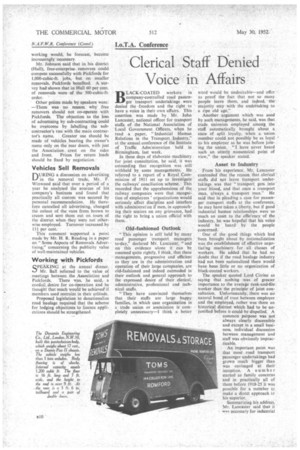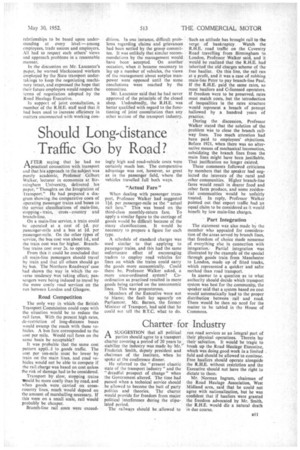I.o.T.A. Conference
Page 44

Page 45

If you've noticed an error in this article please click here to report it so we can fix it.
Clerical Staff D'enied Voice in Affairs
BLACK-COATED workers in company-controlled road passenger transport undertakings were denied the 'freedom and the right to have a. voice in their own affairs. This assertion was made by Mr. John Lancaster, national officer for transport staffs of the National Association of Local Government Officers, when he read a paper, "Industrial Human Relations in the Transport Industry," at the annual conference of the Institute of Traffic Administration held in Birmingham, last week.
In these days of elaborate machinery for joint consultation, he said, it was astound:ng that recognition was still withheld by some managements. He referred to a report of a Royal Commission of 1911 set up to investigate the railways' conciliation scheme. This recorded that the apprehensions of the railway companies were that recognition of employees ' organizations would seriously affect discipline and interfere with administration if men, in approaching their seniors on any grievance, had the right to bring a union official with them.
Old-fashioned Outlook
"This opinion is still held by many road passenger transport managers to-day," declared Mr. Lancaster, "and on this evidence alone it can be assumed quite rightly, I think, that these managements, progressive and efficient as they are in the administration and operation of their large companies, are old-fashioned and indeed outmoded in their outlook and general approach to the expressed desire of their clerical, administrative, professional and technical staffs.
"They have convinced themselves that their staffs are large happy families, in which case organization in a trade union or association is completely unnecessary—I think a better word would be undesirable—and offer as proof the fact that not so many people leave them, and indeed, the majority stay with the .undei;taking to a ripe old age." • .
Another argument which was used by such managements, he said, was that trade unionists employed among the staff automatically brought about a state of split loyalty, when a union member could not possibly be as loyal to his employer as he was before joining the union. "I have never beard such an utterly nonsensical point of view," the speaker stated.
• Asset to Industry
From his experience, Mr. Lancaster contended that the reason that clerical staffs did not leave transport undertakings was that "transport gets into your blood, and that once a transport man, always a transport man." He said that in pleading a case for passenger transport staffs at the conference, he may have taken a liberty, but if good industrial human relationships were so much an asset to the effic'ency of the industry, he was hopeful that his voice would be heard by the people concerned.
One of the good things which had been brought about by nationalization was the establishment of effective negotiating machinery, for all classes of workers. He added that he had no doubt that if the road haulage industry had not been nationalized there would have been little or no organization of black-coated workers.
The speaker quoted Lord Citrine as saying that nothing was of greater importance to the average rank-and-file worker than the principle of joint consultation. Unfortunately, there was no natural bond.of trust between employer and the employed, rather was there art historical distrust which had to be unjustified before it could be dispelled. A common purpose was 'not always clearly discernible and except in a small business, individual discussion between management and staff was obviously impracticable.
An important point was that most road transport passenger Undertaking.s had grown much bigger than was envisaged at their inception. A number started as family concerns and in practically all of them before 1918-25 it was possible for a member to make. a direct approach te his superior.
Summarizing his adclies., , Mr. Lancaster said that it wnS necessary for industrial
relationships to be based upon understanding at every level —among employees, trade unions and employers. All had to respect each others' views and approach problems in a reasonable manner.
In the discussion on Mr. Lancaster's paper, he warned biackcoated workers employed by the State transport undertakings to keep the negotiating machinery intact, and expressed the hope that their future employers would respect the terms of negotiation adopted by the Road Haulage Executive.
In support of joint consultation, a member of the R.H.E. staff said that it had been used to increase efficiency in matters unconnected with working con
ditions. In one instance, difficult problems regarding claims and grievances had been settled by the group committee. It was unlikely that similar recommendations by the management would have been' accepted. On another occasion, when it became necessary to lay up a number of vehicles, the views of the management about surplus manpower were opposed until the same conclusions were reached by the committee.
Mr. Lancaster said that he had never approved of the principle of the closed shop. Undoubtedly, the R.H.E. was better qualified with regard to the functioning of joint consultation than any other section of the transport industry.




























































































